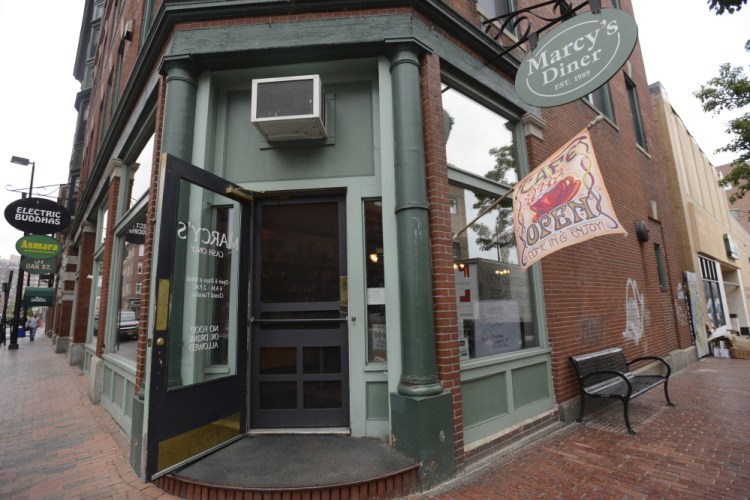Two separate incidents that occurred in Maine over the weekend offer businesses a crash course in how to respond – and how not to respond – to a flood of criticism on Facebook and other social media.
Saco-based Funtown Splashtown USA’s social media nightmare stemmed from an alleged bullying incident at a similarly named but unrelated water park in Texas. In the case of Marcy’s Diner, it started with a customer complaint on Facebook about how the downtown Portland diner’s owner, Darla Neugebauer, handled a situation involving a screaming toddler.
Funtown Splashtown followed a carefully considered crisis-management plan and by Monday was receiving apologies from those who initially had criticized the park. Meanwhile, the owner of Marcy’s Diner continued to polarize potential customers by first attacking her critics with insults and curses, and then removing all reference to the incident without apology or explanation.
“Whether you agree with what she did or not, her raw language after the fact exacerbated the problem,” Portland-based social media strategist Abbie McGilvery said about Neugebauer’s profanity-laden posts on the Marcy’s Diner Facebook page, which were later taken down.
Both incidents illustrate how quickly a virtual lynch mob can form on Facebook and Twitter to go after an establishment that is perceived as unethical or unprofessional. With billions worldwide now using various forms of social media, it’s a problem that has grown in frequency. Many large, national companies have been hit hard on social media over the years, including Sony, McDonald’s, Bank of America – even Facebook and Twitter.
It has happened before in Maine: A 2013 incident in which Atlantic Adventures owner Jim Harkins was caught on video berating a cyclist and making a homophobic remark created a frenzy so damaging to his Portland business that two years later, Harkins says he has sworn off Facebook forever. Yet another social media firestorm erupted over a confrontation between a cyclist and a school bus driver in April, which led to an internal investigation by the South Portland School Department.
Negative sentiment can spread at a breakneck speed across social media platforms, and remnants of that sentiment will forever remain, social media experts said.
“The thing we know is, it’s never really gone,” said Maureen Ebben, a University of Southern Maine associate professor of communication and media studies. “With social media … you can check out, but you can never really leave.”
NOT AT MY WATER PARK
Ed Hodgdon made a frantic call to the Portland Press Herald newsroom Sunday morning after Funtown Splashtown’s Facebook page was hit with a torrent of criticism.
Comments had begun popping up on the park’s Facebook page starting late Friday from irate customers vowing never to bring their families again to the popular amusement destination, and telling the park’s employees they should be ashamed of themselves.
After a bit of searching online, Hodgdon found a news report by a San Antonio TV station about an alleged incident in which a boy with autism was heckled by two teenage employees of Splashtown San Antonio, a waterpark that Hodgdon said has no relation to the park in Saco.
The news report, by San Antonio’s KENS 5 Eyewitness News, said 11-year-old Dylan Dean was about to go down a water slide when two waterpark employees began laughing, pointing at him and calling him fat. According to the report, Dean is autistic and has a medical condition that causes him to gain weight.
The story was mentioned Friday by talk show host Ellen DeGeneres on her show, “Ellen.”
Hodgdon, who is in charge of marketing for the Saco park, said the negative reaction on Facebook was swift and overwhelming. “We just got caught up in the social media wave,” he said.
In addition to notifying local news outlets of the mix-up, Funtown Splashtown representatives began responding individually to every negative post, trying to convince critics that it was a case of mistaken identity. At first, some refused to accept that the Saco park was not at fault, but eventually, the tide turned, Hodgdon said.
Dean’s mother, Tracy Dean, even called the park later to apologize, he said, although the mistake had not been hers. “I would like to reiterate that Splashtown in San Antonio has no affiliation with Funtown Splashtown,” she posted on the Saco park’s Facebook page.
Hodgdon said that as of Monday, the negative comments had stopped, and that the incident ended up being a good learning experience.
“We were able to handle a situation that most businesses will never have to deal with, and we also brought attention to the issue of bullying,” he said.
DISCORD AT THE DINER
In contrast, the Marcy’s Diner Facebook page remained a battleground on Monday, even though the owner’s opening salvo had been deleted.
Neugebauer had posted about an incident Saturday in which she had shouted at a toddler in the diner to shut up after the parents had failed to stop her screaming for 40 minutes. The post, which mostly criticized the parents for failing to control their child, contained coarse language and references to the toddler as a “beast” and a “monster.”
The girl’s mother, Tara Carson, fired back in the comments that “my almost (two-year-old) was screamed at in the face by the owner and kicked out of the restaurant for crying at the table.”
From there, the conflict escalated. Neugebauer replied that Carson was “ignorant” for ordering her toddler three large pancakes (which are one inch thick and as big around as dinner plates), and that the parents had let the child scream for 40 minutes while they continued their conversation and ignored her. Then she got nasty.
“You just sit there and let your (expletive) screaming kid go!” she wrote, adding that it angered her staff and patrons. “(Expletive) you!”
News of the Facebook battle spread rapidly, with thousands commenting on the website on Sunday and Monday. Many sided with Neugebauer and chastised Carson for acting entitled and bad parenting. Another large group blasted the owner for being rude and unprofessional, vowing never to eat at Marcy’s Diner. Some said both Carson and Neugebauer were at fault.

Above: a screenshot of dueling online reviews for Marcy’s Diner.
In the 24-hour period from Sunday to Monday evening, more than 2,000 people posted one-star reviews of the Facebook page, and nearly 3,000 people posted five-star reviews.
Neugebauer did not respond to a request for comment Monday. Her original Facebook posts have been removed but still can be found along with the original Press Herald article and on other digital media sites.
WHAT DID WE LEARN?
The Funtown Splashtown and Marcy’s Diner incidents aren’t really comparable, even though they both involved social media, Ebben said. The water park was merely a victim of mistaken identity, while the diner was criticized for things its owner actually wrote on Facebook.
“Funtown was an innocent bystander,” she said.
While it’s clear that the park handled its crisis in a better way, its dilemma was not as complex. It can be difficult to defend one’s own actions against hundreds of critics, as Neugebauer was placed in a position of having to do, Ebben said.
“Everyone’s kind of piling on,” she said. “It’s only natural to feel like you’re sort of being attacked.”
Studies have shown that group criticism tends to escalate on social media in a way that makes it difficult to resolve, Ebben said. People take sides and place blame. More nuanced opinions are suppressed.
For business owners, that is all the more reason to choose carefully when expressing an opinion on Facebook or Twitter, said Samantha Stern, owner of Stern Social Media in Portland and social media strategist for The VIA Agency.
“You need to hold yourself to a higher standard if you’re a business owner,” she said. “Profanity is never an excusable behavior for a business owner.”
Stern said the best option for Neugebauer would be to issue a public apology for her abrasive language, even if she doesn’t back away from the way she handled the screaming toddler.
Left unaddressed, her words will continue to make not only the diner look bad, but Maine as a whole, she said.
“That attitude is not something that encourages people to come here,” she said.
Harkins, the owner of Atlantic Adventures whose own comments put him in hot water on Facebook two years ago, said he has taken a different approach. He simply doesn’t use it anymore.
“We’ve completely unplugged all of our social media advertising, and we’re much better off,” he said. “It’s not a question of if you’re going to be attacked; it’s a question of when you’re going to be attacked.”
Send questions/comments to the editors.





Comments are no longer available on this story